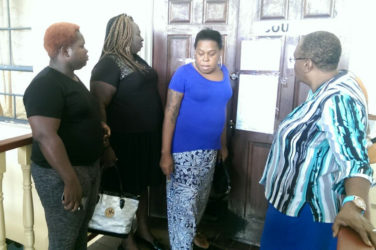City Magistrate Dylon Bess once again barred a transgender woman from entering his courtroom yesterday before dismissing an assault case in which she was the complainant.
For the second time, members of the public were asked to leave the courtroom when the case was called. Petronella Trotman, born Ronell Trotman, who was the virtual complainant, was also told by the court orderly that she would have to leave the courtroom, while the defendant, Jamoul Franklin, remained.
Trotman had previously been barred from entering the court when dressed in female attire and the magistrate had asked that on her return to court on the next occasion that she dress in pants and a shirt and without earrings. Failing to do so, he warned, would result in her being dealt with accordingly.

Yesterday, Trotman, who was dressed in female attire, waited for several minutes after the case was called and the accused subsequently exited the courtroom and informed that the matter was dismissed by the magistrate.
When the accused was asked by reporters on what grounds the matter was dismissed, he said he wanted nothing to do with a news story.
Meanwhile, while the court was in recess, reporters asked the prosecutor, court clerk and court orderly about the reasons for the dismissal of the case but they all refused to comment or give an explanation for the decision.
Trotman, who was disappointed by the magistrate’s decision, told Stabroek News that the case got dismissed even though she was present and did not get a chance to give her side of the story. She said she was unsure if she will appeal the matter.
Three days ago, in a unanimous decision, the Court of Appeal upheld the ruling of former acting Chief Justice Ian Chang that both men and women are free to cross-dress in public once the reason for doing so is not an “improper purpose.”
Appellants Quincy McEwan, known as Gulliver, Seon Clarke, known as Angel Clarke, Joseph Fraser, also known as Peaches Fraser, and Seyon Persaud, also known as Isabella Persaud, had appealed the initial ruling to seek clarity on what constituted “improper purpose.”
They appealed in part because of what they referred to as the inherent uncertainty in the terminology employed in the statute. Their contention too was that it contravenes the prohibition of discrimination and the guarantees of equality and freedom of expression, under Articles 149 and 146 of the Constitution.
In an oral delivery of the panel’s ruling, acting Chancellor Carl Singh noted that it was not for the court to attempt a definition of a broad term. He stressed that in each case, it is for the magistrate to decide, on a case-by-case basis, based on the facts before him or her, whether a man wearing female clothing was for “an improper purpose,” and vice versa.





